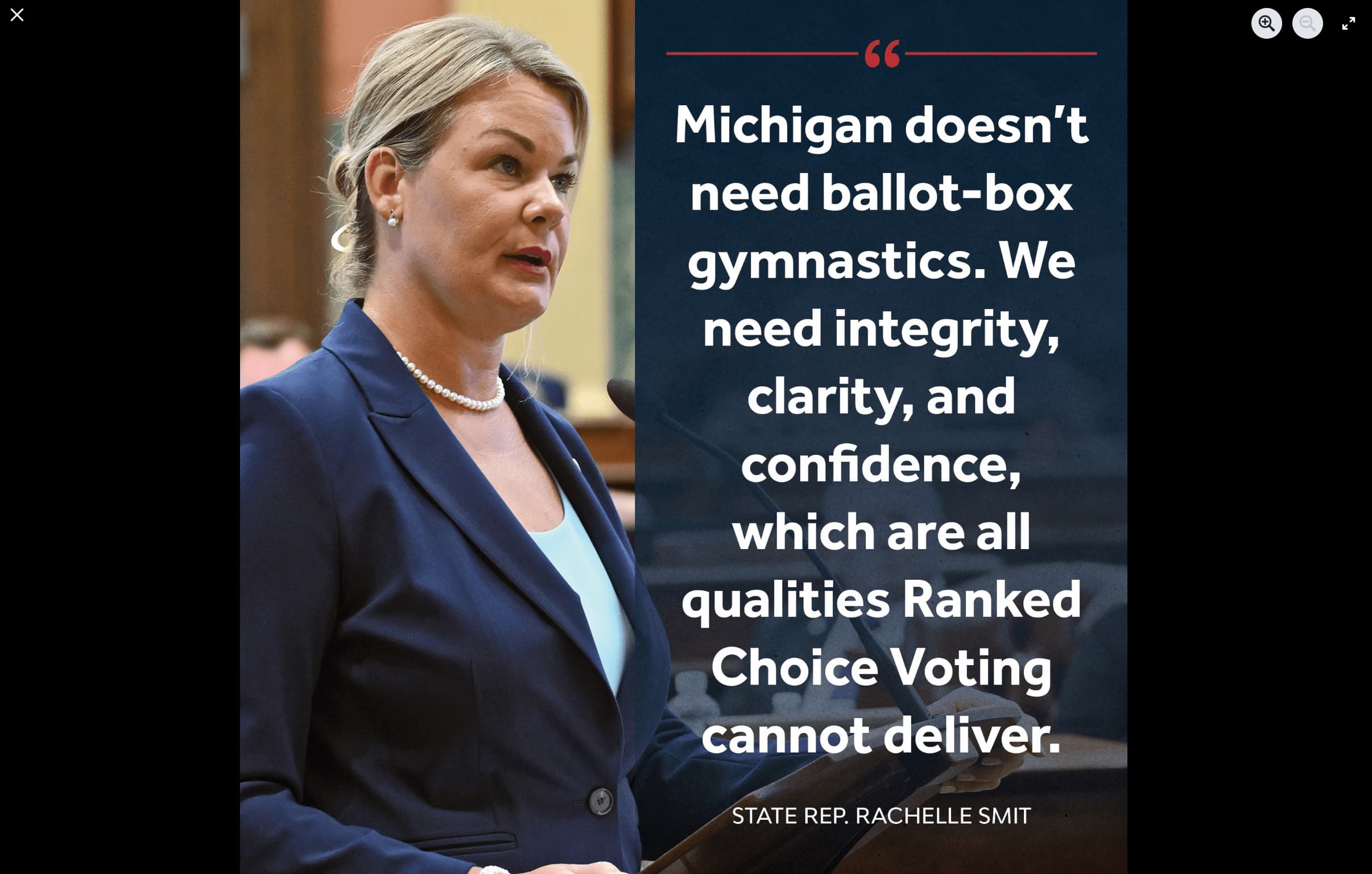

Those who support Ranked Choice Voting (RCV) say it would empower the voter in that, according to Rank Mi Vote, it would “strengthen the republic, improve representation, and make politics more civil.”
Those who are against RCV call it confusing and disenfranchising to the voter. Additionally, according to the Honest Elections Project, it “depresses turnout, delays results, and leads to unusual election outcomes in which candidates who win the most votes can wind up losing the election.”
With RCV, if there are four candidates for the same position, voters have the opportunity to vote for all four by rank. For example, take the top four of the 2022 candidates for Michigan governor—Gretchen Whitmer, Tudor Dixon, Mary Buzuma, and Donna Brandenburg.
Using RCV, voters would indicate their first, second, third, and fourth choice on their ballot. When the votes are tabulated, if there is a candidate who both has the most votes and has over 50% of the votes, that candidate wins in the first round. In 2022, Whitmer received not only the most votes, but 54.5% of the votes. So, even with RCV voting, Whitmer would have won.
If, however, Whitmer had the most votes but only 49% of the vote, then another round of tabulation would have been required. Brandenburg, the candidate with the lowest number of votes would have been eliminated after round one. The ballots listing Brandenburg in first place would have then been adjusted so that the next ranked candidate became the first choice on that ballot. So, if a voter had listed Brandenburg as first and Tudor next, now that ballot would read as though Tudor were the first choice.
If, however, the voter only had ranked Brandenburg and no other candidates, the ballot at that point would be eliminated. The process is repeated until one candidate has a majority of the first-place votes that remain. Using this method, Buzuma, who placed third in the initial round, could have ended up winning the race by the end if she garnered a majority of the remaining ballots by the last round.
(For those struggling to understand RCV, sometimes a visual can help.)
According to the National Conference of State Legislatures, as of May 2025, Alaska, Maine, Hawaii, and Washington, D.C. are the only U.S. locations to require RCV in some capacity. Five other states permit the method but don’t require it, whereas 16 states fully or partially prohibit it.
There are 26 states, including Michigan, in which the legal status of RCV is unclear—neither permitted nor prohibited. As a result, five Michigan cities—Ann Arbor, Ferndale, East Lansing, Kalamazoo, and Royal Oak—already have voted in favor of RCV but are waiting until the state decides before making the change.
It is this lack of clarity that has left Michigan ripe for battle.
Currently, the proponent called Rank Mi Vote has a petition circulating through January 2026. If the group obtains enough signatures, RCV could be voted on in November of 2026. If the initiative were to pass, voters would see RCV implemented on their ballots beginning 2029.
Rank Mi Vote promotes that RCV would do away with negative campaigning. Since candidates need 50% of the vote to win, RCV incentivizes candidates to “build collaboration and build coalitions with other folks” outside of their base group of supporters.
All the while Rank Mi Vote is collecting signatures, Michigan House Representative Rachelle Smit has been working to bring clarity to Michigan’s stance on the issue. On July first of this year, Rep. Smit, along with Rep. Luke Meerman and others, introduced House Bill 4707 to the House of Representatives which would prohibit RCV in Michigan. The bill passed in the House on 8/20/25 and advanced to the Elections and Ethics Committee.
Rep. Smit has called RCV confusing and says it violates the principle of one person, one vote. She explained that with multiple rounds of tabulation, RCV allows candidates to win who do not have the majority of the original placed votes. “What Michigan citizens will end up with are politicians who most people do not want to be elected… It’s a process so convoluted and susceptible to thousands of mistakes, that a winner is often not chosen until weeks after the election day.”

The Heritage Foundation issued a brief entitled, “Ranked Choice Voting is Bad for Voting.” In the brief, the authors discuss “ballot exhaustion” which they define as when voters with RCV ballots only rank their first choices rather than all the choices. If during the tabulation their first choices are eliminated, those voters will not be represented in the final round. So then is the final round representing the actual majority or a “faux” majority where voters have been disenfranchised? The authors also suggest that with RCV there is a way to “game the system,” claiming it would not be difficult with today’s social connections to coordinate the “up voting” of more desired candidates while pushing less desired candidates to the bottom.
Alaska, one of the states currently requiring RCV, lists on the state website that RCV “gives voters more opportunity to express their true preferences without fear of accidentally helping elect candidates they don’t support.”
But if you’re voting on an RCV ballot and you rank all your choices, how has it not helped those candidates you ranked last? It seems you have given those candidates a vote that would add to their majority if your top choices were eliminated.
While HB 4707 works its way through committee and to the Michigan Senate, there is still time for Michigan residents to voice their views to their legislators.

Krista Yetzke is a native of Ottawa County. A jeep-driving, guitar-playing wife, mom, and everyday adventurer, Krista was raised on the love of Jesus, the great outdoors, the arts, the value of frugality, and the beauty of food as medicine.